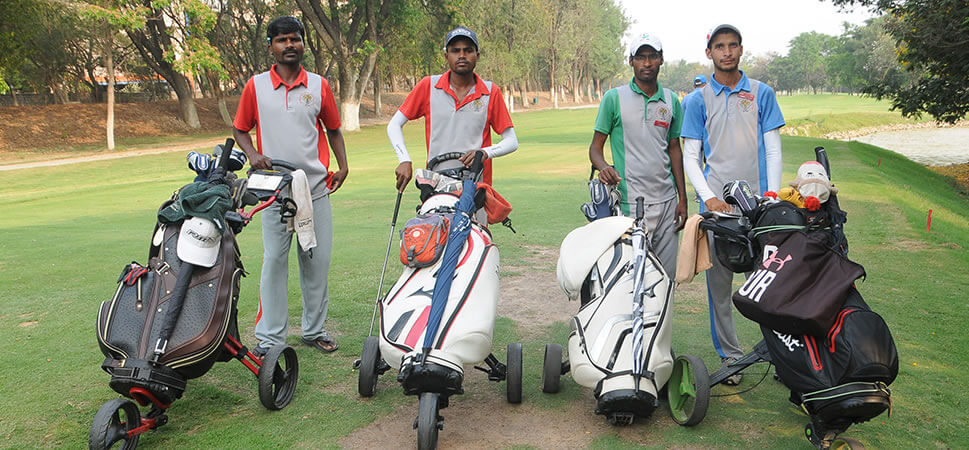This pandemic has brought all human activity and most industries across the world to a standstill. The IPL’s jam-packed stadiums, kids’ summer training camps and even the 2020 Tokyo Olympics have all been put on an indefinite pause. With many other smaller tournaments and leagues being put on hold, everyone associated with sports has had to warm the benches.
Far away from the spotlight of big-money auctions and quarantine workout videos are the footsoldiers of sport — your local caddy, ball-boy and groundsman. Come rain or shine, these workers keep the sports machine ticking. Today, they find themselves struggling to make ends meet with no tangible end to their struggles in sight.
Every Athlete Knows Their Worth
Almost all major metros in the country have golf courses. Two of the best ones are the Karnataka Golf Association (KGA) and Bangalore Golf Club (BGC), both of which have hosted several Pro-Am and international events.
But, think about this: what is golf without caddies? They are a golfer’s biggest asset, lugging around heavy putts and guiding their shot-making through every bit of undulating green. Some may even go far as saying that the success of a golfer depends on choosing the right caddie.
Between KGA and BGC alone, over 300 caddies are regularly employed. A caddie would make ₹500 to ₹1000 a day on average — a regular income that has now dried up. The KGA and BGC have extended their support, as Sunil K. Vas, the Secretary of the BGC tells me:
“Although caddies are of different grades [depending on their experience and seniority], we have given all of them a fortnightly allowance of ₹400 each. This will continue even after the lockdown is lifted because we do not know when normalcy will resume… We also pay the daily wage workers, who keep the greens clean. Besides this, there is a Core Trust, with contributions from golfers, members, and some corporates. This supports the educational needs of our caddies’ children, right from school to college.”
Not knowing what to do in the near future worries these caddies. “On average, I used to spend eight hours at work and earn at least ₹500 per day. Now, without any work, I feel rusty. Most of us don’t know any other vocation to keep ourselves busy, so we long to get back to business,” says Chikkanna* from Bengaluru.
It could be a while before ‘business’ resumes for local groundsmen. In cricket, for example, they have the onerous task of preparing a pitch as per the curator’s direction besides rolling and levelling the 22-yard strip to ensure that the ground is level before a match. The Karnataka State Cricket Association (KSCA), easily the richest sports body in the State, has been able to soften the blow, says Vinay Mruthyunjaya, the media spokesperson of the KSCA: “We have been paying all our ground staff [about ₹15,000 per month] during the lockdown period. Even the seasonal labourers are being paid. We are not shirking any responsibility in this respect.”
Ground staff trying to dry the pitch at Chepauk with coals !! pic.twitter.com/6kgphnDvY0
— Nasser Hussain (@nassercricket) December 14, 2016
Private Academies Are Suffering
Irfan Sait, who runs the biggest private academy in the State — the Karnataka Institute of Cricket (KIOC) — tells me he is in deep trouble. “What I generate from video classes and individual digital analysis for players just about covers my staff’s payments. I can keep this going for two more months, but if it goes beyond that, I don’t know where to turn to,” he says.
Happy to have launched KIOC’s https://t.co/yNPaZN4ALI No VIRUS can keep cricket away !
— irfan sait (@cricketkioc) April 20, 2020
The cricketer-turned-coach has had to dig deep to support his groundsmen. “We took a conscious decision to keep paying our staff. They come from small towns like Ramanagara and Mandya… even as far as Andhra Pradesh to earn a livelihood here. Many of them stay on the ground premises and we provide three meals a day, besides their salary. I, for one, cannot sleep if they go hungry,” remarks the large-hearted Sait. The question is how long he can sustain this, what with having 176 ground staff spread across three centres in Bengaluru and Mysore.
Just as golfers need their caddies and cricketers their curated pitches, tennis academies rely heavily on a set of multifaceted “auxiliary” workers who have been badly hit. Ball-boys and girls usually return balls to players when they go out of play, but many double up as linesmen in local tournaments. Tennis markers prepare the courts, feed players during multiball practice and also serve as hitting partners to a player. On average, a ball boy earns ₹5,000 a month while a marker earns ₹15,000 to ₹20,000.
There are over 40 academies and training centres in Bengaluru alone, all of which have remained closed since March 24th. Besides these informally contracted workers, the Karnataka State Lawn Tennis Association (KSLTA) and private clubs also employ ground staff and coaches who are without work.
While the KSLTA claims that all their ground staff have been paid for March and April and that the Association will take care of their needs, the case is not the same in clubs and private academies. This is because the lockdown has come during peak summer-camp and training season, which is when their programmes generate the most funds. With several academies paying monthly dues for the courts they are leasing, their ground staff have been left to their own devices. Muruga*, a ball boy at a centre in Rajaji Nagar, has taken to distributing newspapers to earn a living. “It is barely enough, but I have no other option,” laments the teenager.
How long can this go on for?
It is now an existential problem for most sports academies. M. Krishna Kumar, the Director of Kinesis Tennis Academy, tells me, “In April, I could only pay my trainers 70% of their salaries. In May, I don’t know how much I can pay them since there is no money coming in. If this continues for the next couple of months, I wonder whether I can stay in this business at all”.
Kumar believes sports operations should slowly restart after May 17th, reasoning that “[the government] opened liquor shops, so why not tennis facilities? A player stands 100 feet away from his opponent on court. We can allow only 30% of our trainees to attend coaching sessions and I can train them one-on-one.” KIOC’s Sait also wants to resume with 30-35% trainees. “We have 36 nets and we can accommodate 100 kids while maintaining social distancing and sanitizing the arena. It is definitely worth a try, and it reduces the burden on us,” Sait adds.
While it seems near-impossible that the sports world will return to normalcy any time soon, the plight of ground staff cannot be ignored for the time being. Without support, an extension to the lockdown would push them into poverty. “We appeal and pray to the government to take note of our difficulties and bail us out, just as they have been helping other poor sections of the society,” says Arul Das, who tends to a football pitch in Bengaluru.
Several sports bodies have sought help for their unsung heroes from different quarters, but there seems to be no unified approach. Perhaps the easiest and most efficient way you can help is by locating your local caddie, marker or groundsman and offer some support to their livelihood. It is the least we can do for all those who make it possible for athletes to hit, sprint and dream.
*Names have been changed on request.
Featured image courtesy the Karnataka Golf Association, for representative purposes.






